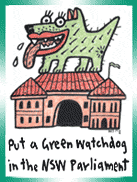Nanotech the new asbestos
Nanotech the new asbestos, Greens call for moratorium
In response to the release of Australia's first inventory of commercial use of nanomaterials, Greens MP and Upper House candidate Lee Rhiannon called on Premier Iemma to put an immediate moratorium on the release of consumer products containing manufactured nanomaterials until adequate regulation is in place and to establish a regulatory body to assess the health and environmental risks of nanomaterials.
Nanotechnology is the engineering of materials at the atomic level.
"Nanomaterials could well be the 21st century's asbestos. The Iemma government is failing to keep up with this fast-moving technology", said Ms Rhiannon.
"Nanomaterials are already in products on NSW shelves and NICNAS report revealed that over ten thousand tonnes of nanomaterials are used in commercial production in Australia each year.
"Despite widespread commercial use, NSW has no nano-specific safety assessment process to protect workers and the environment from unsafe exposure and no labelling requirement for nanomaterials in products.
"Yet the public is none the wiser to the risks of slapping suncream or shampoos containing nanoparticles on our families and sending people off to work in factories that handle this potentially toxic technology.
"The Greens call on Premier Iemma to put an immediate moratorium on the release of consumer products containing manufactured nanoparticles and to establish a NSW regulatory body to assess the health and environmental risks of nanoparticles.
"Premier Iemma is taking a foolhardy and dangerous approach to allow nanomaterials into commercial industries in NSW with no regulatory oversight.
"Because of their very small size and higher chemical reactivity, nanomaterials can be more toxic than the same materials in bulk form. They are more readily inhaled than larger particles, can be ingested, and may even be absorbed through the skin.
"Test tube studies have shown that nanomaterials can be toxic to human tissues and cells, resulting in DNA mutation and even cell death".
"In 2004, the United Kingdom's Royal Society recommended that given their toxicity risks, nanomaterials should be subject to rigorous safety assessments prior to their commercial release, and factories and laboratories should treat nanomaterials as if they were hazardous.
"Three years later, we can buy products containing nanomaterials and there is still no regulatory oversight of nanoparticles.
"Premier Iemma has been in negotiations with the Federal government for over a year to develop a National Nanotechnology Strategy. A protracted talk-fest is not good enough when these products are already on our shelves unlabelled.
"If the Iemma government wants to avoid a repeat of the asbestos tragedy, urgent action is required before industrial use of nanomaterials expands", said Ms Rhiannon.




